

Base de Typographie de la Renaissance. Marcas Tipográficas. Exposiciones virtuales del Fondo Antiguo de la Biblioteca de la Universidad de Navarra. Biblioteca. Universidad de Navarra. ArXiv.org e-Print archive. 10 Search Engines to Explore the Invisible Web.
Not everything on the web will show up in a list of search results on Google or Bing; there are lots of places that their web crawlers cannot access.
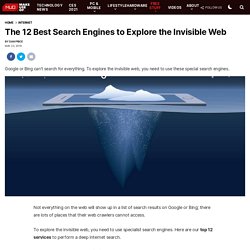
To explore the invisible web, you need to use specialist search engines. Here are our top 12 services to perform a deep internet search. What Is the Invisible Web? Before we begin, let's establish what does the term "invisible web" refer to? Simply, it's a catch-all term for online content that will not appear in search results or web directories. There are no official data available, but most experts agree that the invisible web is several times larger than the visible web. The content on the invisible web can be roughly divided into the deep web and the dark web. The Deep Web The deep web made up of content that typically needs some form of accreditation to access. If you have the correct details, you can access the content through a regular web browser. The Dark Web The dark web is a sub-section of the deep web. 1. 2. 3. 4.
Understanding the deep Web in 10 MinUtes. Understanding the deep Web in 10 MinUtes. Everything You Want To Learn About Google! Punctuation, symbols & operators in search - Search Help. You can use symbols or words in your search to make your search results more precise. Google Search usually ignores punctuation that isn’t part of a search operator. Don’t put spaces between the symbol or word and your search term. A search for site:nytimes.com will work, but site: nytimes.com won’t. Refine image searches. Digital Library of Wielkopolska.
Guía de Recursos en Internet para Investigadores. Una selección de recursos en línea para la investigación y la docencia elaborada por José Luis Orihuela (Universidad de Navarra). 1) Buscadores Bielefeld Academic Search EngineMotor de búsqueda multidisciplinar de recursos académicos desarrollado por la Biblioteca de la Universidad de Bielefeld en Alemania.
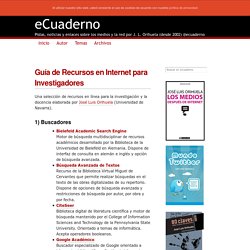
Dispone de interfaz de consulta en alemán e inglés y opción de búsqueda avanzada. Búsqueda Avanzada de Textos Recurso de la Biblioteca Virtual Miguel de Cervantes que permite realizar búsquedas en el texto de las obras digitalizadas de su repertorio. DOAB: Directory of Open Access Books. Bernard M. Rosenthal, Dictionary of Abbreviations - Article livres rares, livres anciens, manuscrits, autographe, éditions originales, livres... - ILAB-LILA.
“German and Italian antiquarian booksellers and auctioneers are very fond of using abbreviations in their catalogs, sometimes on a rather lavish scale.
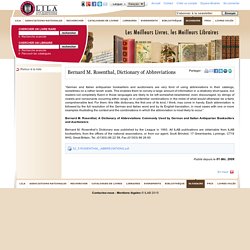
This enables them to convey a large amount of information in a relatively short space, but readers not completely fluent in those languages are likely to be left somewhat bewildered, even discouraged, by strings of vowels and consonants occurring either singly or in unfamiliar combinations in the midst of what would otherwise be a fairly comprehensible text. For them, this little dictionary, the first one of its kind, I think, may come in handy. Each abbreviation is followed by the full resolution of the German and Italian word and by its English translation, in most cases with one or more examples illustrating the context and the combinations in which the abbreviation is most likely to occur.”
Bernard M. Rosenthal, A Dictionary of Abbreviations Commonly Used by German and Italian Antiquarian Booksellers and Auctioneers. Glossaire et dictionnaire de termes pour libraires et collectionneurs de livres rares et anciens - Français - ILAB-LILA.
Bibliotecas - Catálogos de Blibiotecas. Blibiotecas Virtuales y Digitales. Bases de datos: publicaciones científicas. Literatura Gris. Recuperación de información: reflexiones epistémicas de una ciencia en su estado embrionario. Índice Anterior Siguiente Artículos históricos Lic.
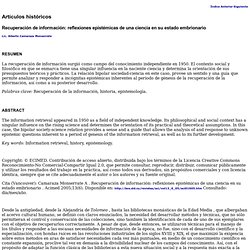
Alberto Camaraza Monserrate. The Seven Ages of Information Retrieval - UDT Occasional Paper #5. UDT Occasional Paper # 5 Michael Lesk Email: lesk@bellcore.com URL: Abstract Vannevar Bush's 1945 article set a goal of fast access to the contents of the world's libraries which looks like it will be achieved by 2010, sixty-five years later.
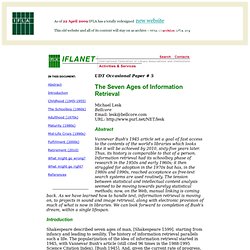
Thus, its history is comparable to that of a person. Information retrieval had its schoolboy phase of research in the 1950s and early 1960s; it then struggled for adoption in the 1970s but has, in the 1980s and 1990s, reached acceptance as free-text search systems are used routinely. The tension between statistical and intellectual content analysis seemed to be moving towards purelyg statistical methods; now, on the Web, manual linking is coming back. Introduction Shakespeare described seven ages of man, [Shakespeare 1599]. starting from infancy and leading to senility. There has, however, been a tension throughout the life of information retrieval between simple statistical methods and sophisticated information analysis. Childhood (1945-1955) Major Events in the History of Information Retrieval. The Major Events in the History of Information Retrieval (in the United States)According to Professors David Scott Dubin and Linda Cheryl SmithUniversity of Illinois Urbana-Champaign, Graduate School of Library and Information Science Caveat: This list is highly skewed toward developments in the United States. 1890: Hollerith tabulating machines used to analyze the US census Herman Hollerith 1945: Vannevar Bush's "As We May Think" appears in Atlantic Monthly Late 1940's: US military confronts problems of indexing and retrieval of wartime scientific research documents captured from Germans. 1947: Hans Peter Luhn (research engineer at IBM since 1941) begins work on mechanized, punch card based system for searching chemical compounds. 1950: The term "information retrieval" may have been coined by Calvin Mooers. 1950's: Growing concern in the US for a "science gap" with the Soviets.
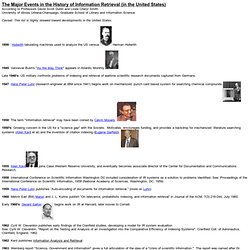
Ciir-publications.cs.umass.edu/pub/web/getpdf.php?id=1066. Recuperación de información. Historia de la recuperacion de Informacion. Information at the speed of thought. Colección de libros [Géneros diferentes] Compartiendo lecturas. Bookcamping. Electronic library. Download books free. Finding boooks. Biblioteca General. Virtual Library (Publications Getty) Enlace de bibliotecas digitales.